Gabon << ga BOHN >> is a small, heavily forested country on the west coast of Africa. It straddles the equator. Gabon is extremely rich in natural resources and is noted for its high-quality lumber. It also has some of the world’s richest iron and manganese deposits.
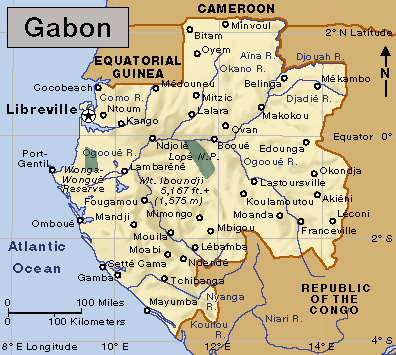
Many of Gabon’s people are farmers who live in small villages along the coast, along the rivers, or in the thinly forested parts of the north. Libreville is Gabon’s capital and largest city. One of the inland towns, Lambaréné, became known as the home of Albert Schweitzer. This much-honored physician, missionary, and musician built his hospital and leper colony near Lambaréné. See Schweitzer, Albert.
Gabon was a French colony from the early 1900’s until it became an independent republic in 1960. Its name in French, the official language, is République Gabonaise (Gabonese Republic).
Government.
Gabon is a republic. The people elect a president, the country’s most powerful official, to a seven-year term. The president appoints a prime minister, who is the head of government. The prime minister, in consultation with the president, appoints the Council of Ministers. This council carries out the operations of the government. Gabon’s legislature consists of two houses: the National Assembly and the Senate. Voters elect the 143 members of the National Assembly to five-year terms. The Senate has 102 members. Senators are elected by regional and local councils to six-year terms. The Gabonese Democratic Party is Gabon’s dominant political party.
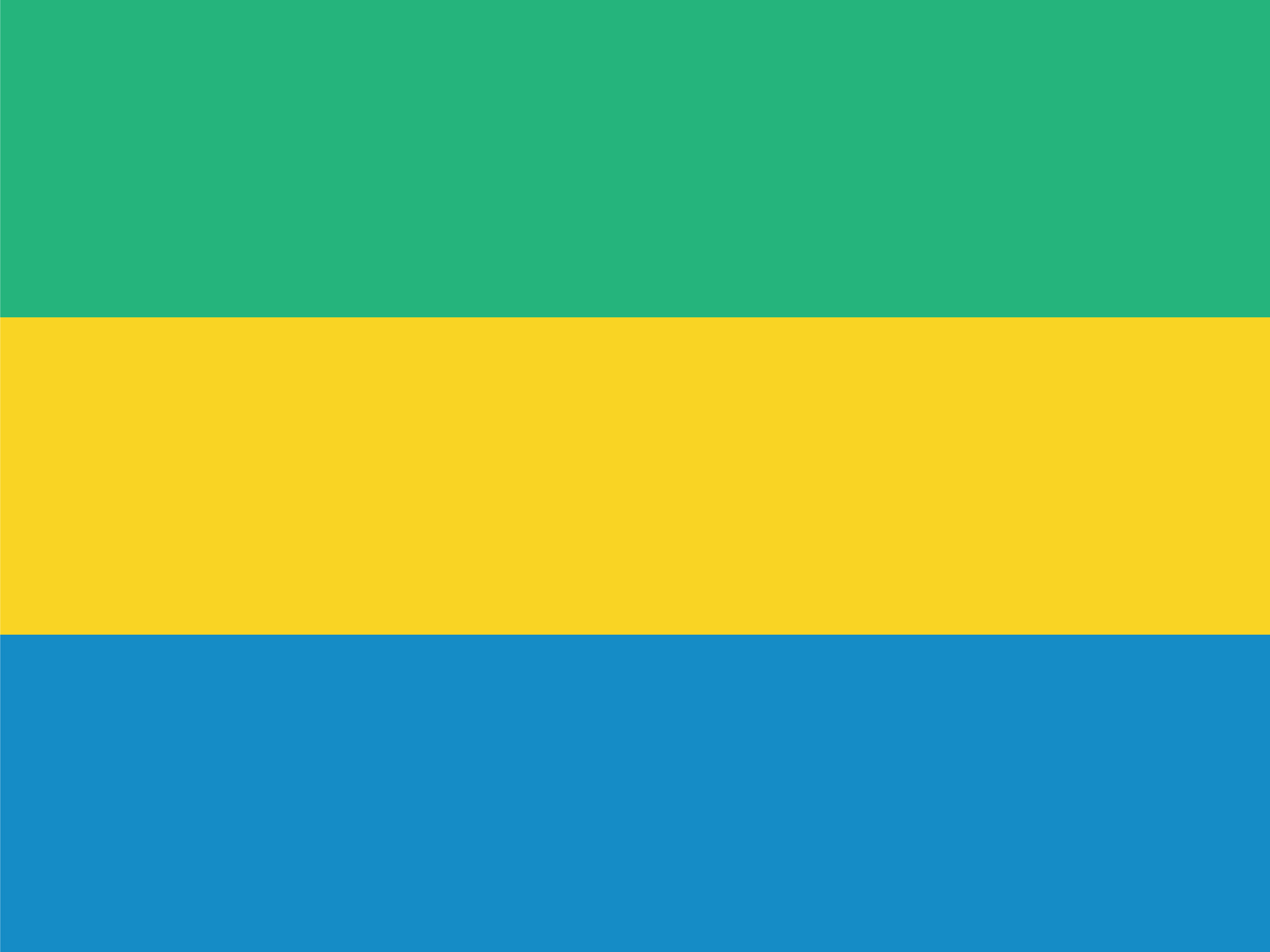
People.
Gabon is one of the most thinly populated countries in Africa. Over 80 percent of the people live in small and large cities. Many people farm in gardens and fields. They plant cassava (a root crop), ground and palm nuts, yams, and many fruit crops. Farmers also raise small livestock for meat. Fish is an important part of the Gabonese diet.
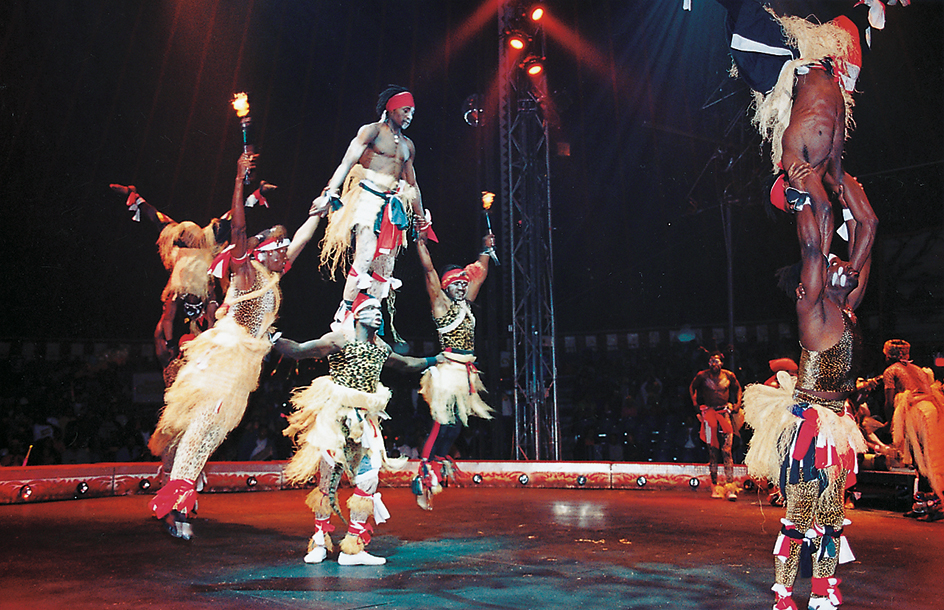
There are many ethnic groups in Gabon. The Fang, the most influential group, live in the north and center. The Omyéné, a small but important group of related peoples, live along the coast. They were the first to meet and deal with European traders and missionaries. This contact gave them an early advantage in education and commerce. Small groups of Pygmies live in the thick southern forest. They hunt and trap animals for food. Some are settled in villages and interact with farmers.
The people in most parts of Gabon once lived in houses that had walls made of mud-covered branches and roofs made of woven grass. These houses had reed mats hanging at the windows and doors. But now many houses have corrugated metal roofs, and Gabonese families now try to save enough money to build concrete houses. Most villages have a meeting place, where the older men of the village gather to visit or to discuss village affairs.
Many Gabonese, especially those in towns, are Christians. Others follow traditional African religions. Music and dancing play a major role in their ceremonies. 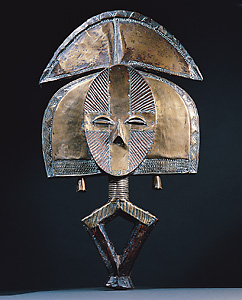
About 90 percent of Gabonese children go to primary schools, and the number attending secondary schools is increasing rapidly. Most of the adults can read and write. Since the mid-1900’s, the number of schools run by churches and by the government has increased considerably. Gabon has a university and medical school in Libreville and a university in Franceville. Since the mid-1900’s, the number of schools run by churches and by the government has increased considerably. Gabon has a technical school in Libreville and an agricultural school in Oyem.
Land.
Gabon lies on the equator and is covered with thick forests. Many palm-lined beaches, lagoons, and swamps lie along the 500 miles (800 kilometers) of coast. Moving inland, the land rises gradually to rolling hills, plateaus, and low mountain ranges that are cut through by valleys of the Ogooué River and its tributaries. About 10 percent of Gabon’s land lies in national parks.
Gabon’s climate is hot and humid most of the year, with a dry season from May to September. Rainfall is heavy throughout the country, especially along the northern coast. Many regions receive as much as 100 inches (250 centimeters) of rainfall a year. The average annual temperature is about 79 °F (26 °C).
Economy.
Gabon is one of the richest countries in sub-Saharan Africa. However, the country’s wealth is not distributed evenly among the people, and many live in poverty. Oil accounts for much of the country’s income, and is, by far, the country’s leading export. However, oil production has been declining since the mid-1990’s.
Gabon is also rich in other natural resources. Lumber is one of the country’s main exports. Gabon’s forests have provided high-quality lumber for over 100 years. Wood from the huge okoumé trees is used for making plywood. Gabonese forests also produce ebony and mahogany. Gabon is one of the world’s leading producers of manganese. The country also has large iron ore deposits.
Agriculture is important to Gabon’s economy. Leading crops include cassava, palm oil, plantains, sugar cane, and yams. Farmers raise cattle, chickens, hogs, and sheep. Manufacturing plays a small role in Gabon’s economy. Leading manufactured products include processed foods, refined petroleum, and timber products. Gabon exports more than it imports. The country’s leading trade partners include China, France, and the United States.
History.
Portuguese sailors were the first Europeans to reach Gabon. They landed on its coast in the 1470’s. Europeans carried on a slave trade with the Omyéné people for hundreds of years.
In the 1840’s, France established a naval and trading station at the present site of Libreville. Missionaries arrived and opened schools. In 1849, the French brought a group of slaves freed by a French ship to settle near the station and named the settlement Libreville (free town). Later, French explorers paddled up the Ogooué River into the interior. The lumber trade developed around the mouth of the Gabon River near Libreville, the Ogooué, and Port-Gentil. 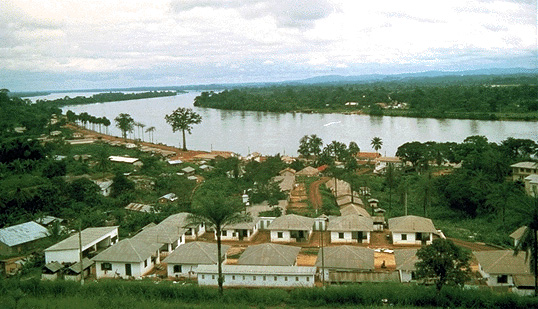
Libreville became the administrative center of the French colony of Gabon. In 1910, Gabon became a colonial territory within the federation of French Equatorial Africa. French companies acquired much land and gained complete control over Gabon’s foreign trade and its forestry products. A large portion of the country’s economy is still controlled by French companies.
Gabon began to move toward independence in the mid-1940’s. It gained control of its internal affairs in 1957, and a legislature elected by the people chose a Council of Ministers. On Aug. 17, 1960, Gabon became an independent country. Leon Mba, who had been head of government since 1957, became president.
In January 1964, Mba dissolved the National Assembly. A month later, army rebels arrested Mba in an attempt to overthrow him. French troops came to Mba’s aid, crushed the revolt, and restored Mba to power. Mba was reelected in 1967, but he died the same year. Vice President Bernard-Albert Bongo succeeded Mba. In 1968, Bongo declared Gabon a one-party state and created the Gabonese Democratic Party as the only legal political party. Bongo was elected president in 1973. After converting to Islam, he changed his name to El Hadj Omar Bongo. He was reelected in 1979 and 1986.
In the late 1980’s, declining oil prices caused an economic recession in Gabon. Government funding for public services fell, and unemployment rose. The gap between rich and poor increased. Beginning in January 1990, widespread demonstrations called for multiparty democracy. Opposition political parties were legalized later that year, and multiparty legislative elections were held. Bongo’s Gabonese Democratic Party won a majority of the seats. In 1993, Bongo faced opposition candidates for the first time but was reelected president. He was reelected again in 1998 and 2005. Bongo died in 2009. Voters elected his son, Ali Bongo Ondimba, to succeed him. Ali Bongo Ondimba was reelected in 2016, but many governments and international organizations questioned the validity of the election.
In 2022, Gabon joined the Commonwealth of Nations, an international association mostly made up of countries and territories that were once under British rule. Commonwealth members cooperate on many economic and foreign policy issues. Gabon is one of several African countries that have joined the Commonwealth despite having no historic ties to the United Kingdom.
In August 2023, President Ali Bongo Ondimba was reelected to a third term. But the election results were widely disputed among the Gabonese people and by international organizations. Soon after Bongo was declared the winner, Gabonese military officers seized power and placed Bongo under house arrest. The coup (sudden takeover) was condemned by the United Nations and the African Union, but many people of Gabon celebrated the end of the Bongo family’s rule. In September, General Brice Oligui Nguema, one of the coup’s leaders, was named Gabon’s transitional president, and Raymond Ndong Sima, a former opposition leader, was named transitional prime minister.
